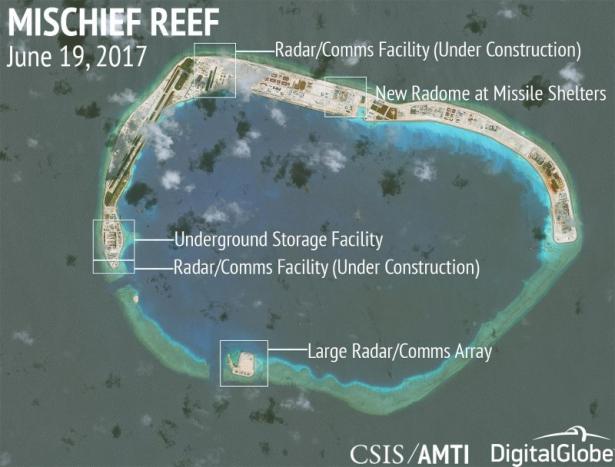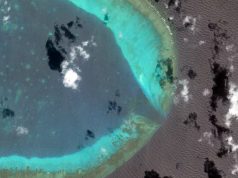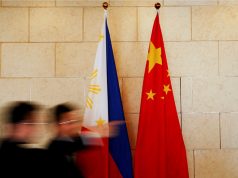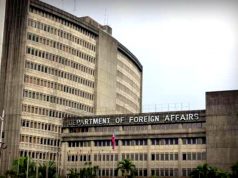
MANILA< Philippines - A year since the Permanent Court of Arbitration upheld the country’s claim to territory in the West Philippine Sea, foreign affairs experts criticized President Rodrigo Duterte for his continued refusal to invoke the verdict in the face of China’s aggressive militarization in the region Duterte has maintained that building friendship with China is a better approach than insisting on enforcing the ruling, which could only anger the Chinese and even invite an armed response. This stance has extended to the country’s chairmanship of the Association of Southeast Asian Nations this year, with the decision not meriting any mention in the chairman’s statement issued during the regional bloc’s leaders’ summit. In just a year, China has built seven artificial islands in the South China Sea and set up military installations on these, alarming the United States, Japan and Australia, as well as other countries with claims to territory in the region. Former Foreign Affairs Secretary Albert del Rosario, who oversaw the Philippine suit against China before the arbitral court, said Duterte’s tack has not stopped the militarization and other “unlawful activities” by China in the disputed territories despite the “most favorable environment” between the two countries. "The positions that we take today will resound over time. In taking the right strategy, our government can only enhance its standing among our peers and ensure its legacy for the generations that will succeed us," Del Rosario pointed out. Foreign affairs expert Professor Dindo Manhit shared the same sentiment and said that, because the Philippines is not the only nation affected by China’s aggression, it could seek the support of other countries and even use its chairmanship of the Association of Southeast Asian Nations this year as leverage. Should Duterte continue to set aside the arbitral court’s ruling, “we might lose more of our territory,” he said. “And what I’m reminding of is the constitutional duty of our government to defend our maritime rights and territorial integrity,” he added. “And based on international laws, we have defined it internally among our laws and ‘yun din naman ang kinatigan ng korte, ng PCA, na it favored us, ‘yung ating argument (that is what the court agreed with, the PCA, it favored us, our argument).”
While acknowledging that Duterte’s approach does have a positive side, Manhit stressed that this should be coupled by a stronger defense of the country’s territory as well as continued attention to relations with other countries to ensure freedom of navigation in the South China Sea.
But a government source told News5 said any attempt by the Philippines to enforce the arbitral ruling could only invite an even more aggressive response from China, which has continued to ignore the verdict, which it considers “ill founded” and “naturally null and void.”
Philippine ambassador to China Chito Santa Romana said that far from neglecting the country’s victory at the arbitral court, the government has merely chosen another path to search for a solution to the dispute while, at the same time, improving relations with China.
“You try to combine principle and pragmatism,” he said. “Principle, you don’t give up your claim and you don’t abandon the tribunal award, but pragmatism because you know, there is a saying that you need two hands to clap, to shake hands, we’re not negotiating alone by ourselves. We are negotiating with another side and the position is different. ”
In a statement released Wednesday, Foreign Affairs Secretary Alan Peter Cayetano echoed Duterte’s stance, saying the administration “reaffirms its unwavering commitment to protect our country’s territorial claims and maritime entitlements, but believes that the ongoing territorial dispute in the West Philippine Sea should further be resolved in a manner consistent with the spirit of good neighborly relations.”
He noted that Duterte’s “priority of regional peace and stability has led to the healthy environment of dialogue, cooperation, and development” and claimed the “bold initiatives of the administration in pursuing an independent foreign policy have become a game changer not only in the geo-political landscape in the region but more importantly in the lives of our people.”
“The Philippine approach has led to great benefits for the country, allowing us considerable economic gains as well as strengthening our status as ASEAN Chair and regional peacemaker,” Cayetano maintained.
Among others, he said, this approach has allowed Filipino fishermen to resume their livelihood at Scarborough Shoal and earned the country “investment and financial assistance commitments upwards of $30 billion from our partners in the region.”
“These significant developments have likewise allowed our defense resources to also address other pressing security concerns facing the country,” he added.
Cayetano said the administration remains “committed to its strategy to strengthen old allies and engage new partner nations” and to be “an enemy to none and a friend to all in its pursuit of economic and political benefits for the country, including the long-term security and stability in the region.”
WATCH BELOW NEWS5’S RELATED VIDEO REPORTS:









